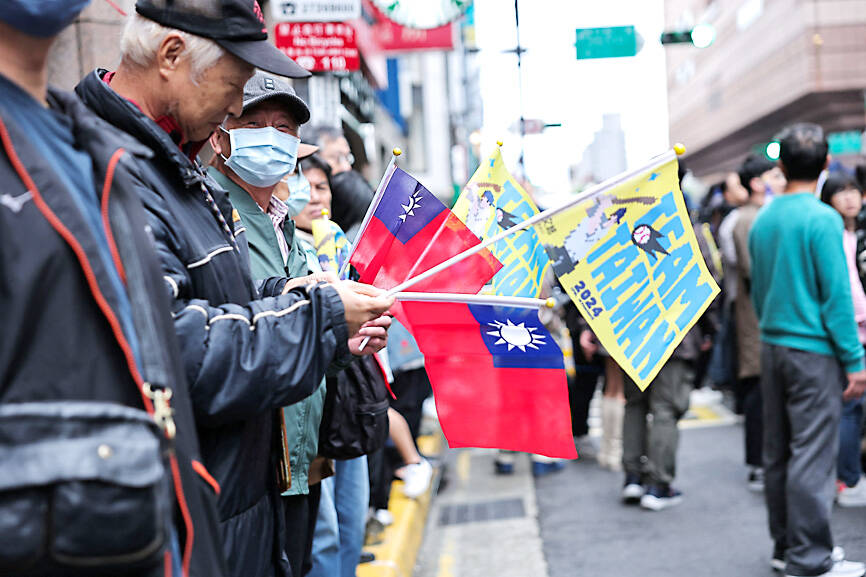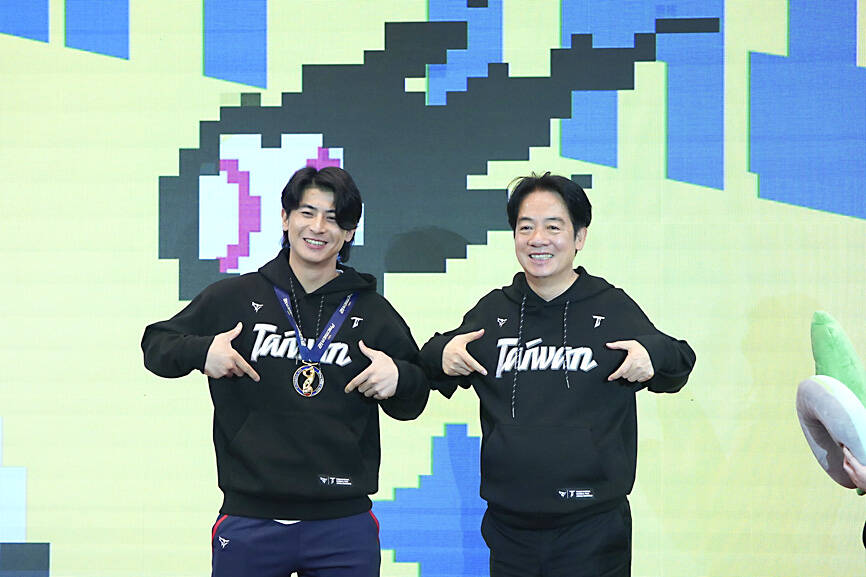Lawmakers yesterday proposed designating Nov. 24 as National Baseball Day and updating the design of the NT$500 bill to honor the national team’s victory in the World Baseball Softball Confederation’s Premier12 championship on Sunday, as thousands of fans came out to see the players parade down the streets of Taipei.
Players, coaches and staff from the national team returned home on Monday night after achieving their best-ever performance in an international baseball tournament.
After receiving a rapturous welcome at the airport, the players turned out yesterday for a street parade in front of thousands of adoring fans waving Taiwanese flags and “Team Taiwan” signs.

Photo: CNA
Employees of a bank climbed out of their first-floor office windows to watch the players go past.
“I couldn’t sleep for two nights, that shows how excited I am,” Victor Chai, 30, said as he stood in the crowd. “I’ve been watching games for 20 years, and I never thought I’d see the day when Taiwan’s team would win an international championship.”
After playing under the name “Chinese Taipei,” the team wore black hoodies emblazoned with “Taiwan” as they stood in the back of military jeeps and trucks.

Photo: Ann Wang, Reuters
The parade ended at the Presidential Office Building, where the team were greeted by President William Lai (賴清德) and Vice President Hsiao Bi-khim (蕭美琴) wearing the same hoodies as the players.
“Thank you for showing Taiwan to the world,” Lai told the players. “Taiwan is not just about semiconductors; Taiwan also has baseball.”
Meanwhile, in the legislature, a bill to make Nov. 24 National Baseball Day was proposed by Democratic Progressive Party (DPP) Legislator Hsu Chih-chieh (許智傑) and cosponsored by 26 of his DPP colleagues.

Photo: CNA
“Taiwan won the Premier12 championship. The first thought that came into my mind was to propose making Nov. 24 National Baseball Day,” Hsu told reporters.
However, the day would resemble a memorial day, such as National Hakka Day on Dec. 28 or National Migrants Day on Dec. 18, rather than a national holiday, he added.
The day would serve to remind people of the historic triumph and raise awareness of sports development in Taiwan, Hsu said, adding that the purpose of the bill has nothing to do with creating a new national holiday.
Lai was also reported to have proposed changing the portrait on the NT$500 bill from that of baseball players of Taitung County Nan Wang Elementary School to that of the national baseball team in the Premier12, which was endorsed by DPP lawmakers.
The central bank said it would cautiously assess the proposal.
Chinese Nationalist Party (KMT) Legislator Jessica Chen (陳玉珍) said Hsu’s proposal needs further deliberation.
“Badminton players Lee Yang (李洋) and Wang Chi-ling (王齊麟) are two-time Olympic gold medalists. Should there not be a National Badminton Day as well?” Chen asked.
Instead of NT$500 banknotes, the portrait on the NT$1,000 banknote could be changed to feature players on the Premier12 championship team, Chen said.
KMT Legislator Hung Meng-kai (洪孟楷) said that changing the banknotes might require more detailed discussions and planning, but what the central bank can do now is issue commemorative coins or banknotes in accordance with the Regulations Governing the Issuance of Gold and Silver Coins and Commemorative Notes and Coins (金銀幣及紀念性券幣發行辦法).
DPP Legislator Tsai Chi-chang (蔡其昌), who also serves as the Chinese Professional Baseball League (CPBL) commissioner, called for legislative support for the budget allocated for sports development to ensure there is sufficient funding for the national baseball team when they compete in the World Baseball Classic qualifiers in February.
Opposition lawmakers have been blocking the review of the proposed general budget.
“The championship title that touched us all was only made possible because of funding approved by the legislature, players’ fighting spirit and collective support of baseball fans,” Tsai said.
“I hope that lawmakers across party lines would think about this touching moment,” he said.
Part of the budget to be allocated to the national baseball team is to fund information-gathering operatives for baseball players competing in Premier12 championship, which many experts have credited as an important factor contributing to their unprecedented success, he said.
As 14 of the 28 players on the team are indigenous, the Council of Indigenous Peoples said it would host a banquet for them and pledged to budget NT$200 million (US$6.15 million) next year to cultivate indigenous athletes.
Chunghwa Post has plans to issue commemorative stamps for the Premier12 championship, Minister of Transportation and Communications Chen Shih-kai (陳世凱) said.
Additional reporting by AFP

ENDEAVOR MANTA: The ship is programmed to automatically return to its designated home port and would self-destruct if seized by another party The Endeavor Manta, Taiwan’s first military-specification uncrewed surface vehicle (USV) tailor-made to operate in the Taiwan Strait in a bid to bolster the nation’s asymmetric combat capabilities made its first appearance at Kaohsiung’s Singda Harbor yesterday. Taking inspiration from Ukraine’s navy, which is using USVs to force Russia’s Black Sea fleet to take shelter within its own ports, CSBC Taiwan (台灣國際造船) established a research and development unit on USVs last year, CSBC chairman Huang Cheng-hung (黃正弘) said. With the exception of the satellite guidance system and the outboard motors — which were purchased from foreign companies that were not affiliated with Chinese-funded

PERMIT REVOKED: The influencer at a news conference said the National Immigration Agency was infringing on human rights and persecuting Chinese spouses Chinese influencer “Yaya in Taiwan” (亞亞在台灣) yesterday evening voluntarily left Taiwan, despite saying yesterday morning that she had “no intention” of leaving after her residence permit was revoked over her comments on Taiwan being “unified” with China by military force. The Ministry of the Interior yesterday had said that it could forcibly deport the influencer at midnight, but was considering taking a more flexible approach and beginning procedures this morning. The influencer, whose given name is Liu Zhenya (劉振亞), departed on a 8:45pm flight from Taipei International Airport (Songshan airport) to Fuzhou, China. Liu held a news conference at the airport at 7pm,

Taiwan was ranked the fourth-safest country in the world with a score of 82.9, trailing only Andorra, the United Arab Emirates and Qatar in Numbeo’s Safety Index by Country report. Taiwan’s score improved by 0.1 points compared with last year’s mid-year report, which had Taiwan fourth with a score of 82.8. However, both scores were lower than in last year’s first review, when Taiwan scored 83.3, and are a long way from when Taiwan was named the second-safest country in the world in 2021, scoring 84.8. Taiwan ranked higher than Singapore in ninth with a score of 77.4 and Japan in 10th with

GRIDLOCK: The National Fire Agency’s Special Search and Rescue team is on standby to travel to the countries to help out with the rescue effort A powerful earthquake rocked Myanmar and neighboring Thailand yesterday, killing at least three people in Bangkok and burying dozens when a high-rise building under construction collapsed. Footage shared on social media from Myanmar’s second-largest city showed widespread destruction, raising fears that many were trapped under the rubble or killed. The magnitude 7.7 earthquake, with an epicenter near Mandalay in Myanmar, struck at midday and was followed by a strong magnitude 6.4 aftershock. The extent of death, injury and destruction — especially in Myanmar, which is embroiled in a civil war and where information is tightly controlled at the best of times —